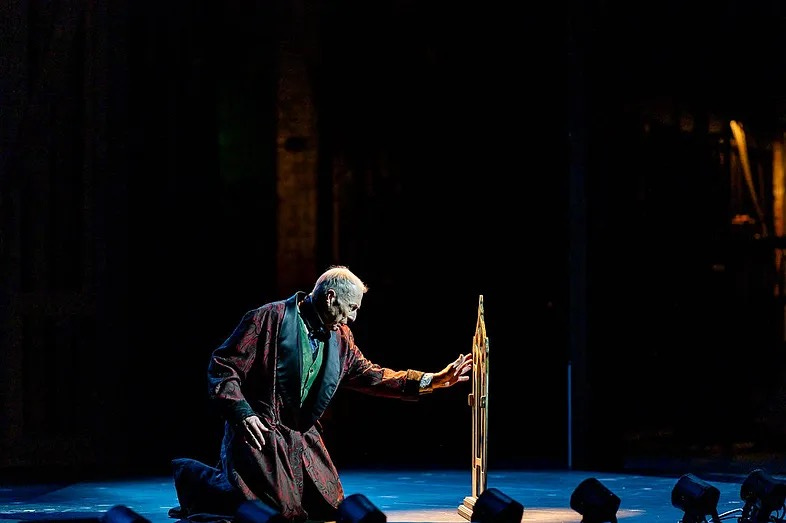
Once upon a time, eight years ago, I was directing the seventh New York production of my stage adaptation of “A Christmas Carol,” which had, over the course of many years, become my calling card, my peculiar obsession, and central to my identity as a theatre artist.
This particular production was already struggling with budget shortfalls and a hostile performance venue when the unthinkable occurred: the 2016 Presidential election. The company reassembled the next night amid foul weather and even fouler moods to rehearse the worst possible scene: Scrooge’s nephew Fred’s Christmas party, a cheerful affair full of song and drinks and jokes at Ebenezer’s expense which, if not for Fred’s loving interventions, would be mean-spirited at best and cynical at worst.
Facing that insurmountable cliff of global despair and creative frustration, I opened the rehearsal by saying to the company the most godawful thing I ever uttered in my directing career:
“I don’t want to talk about it, and you don’t want to hear it. Let’s just get to work.”
The rest of that production process was consequentially and equally frustrated and joyless. I abdicated my leadership by giving up on hope and giving in to cynicism, and I’ve never forgiven myself for it.
And yet here we are again, with the barbarians of bitterness at the gates of another holiday season, and a new production of my “Carol,” this time in Boston with Commonwealth Shakespeare Company, being born amid political and cultural mayhem. I’ve had years to think about the errors of my “Christmas Carol” past, and I find myself arriving at this moment of gloom differently. For those of us tasked with telling this tale in such an objectively bleak time, there is a glimmer of opportunity, much like the one offered to Scrooge, for redemption and reclamation — to boldly choose and champion an unfashionable yet revolutionary optimism; great expectations, if you will.
If there is a War of Christmas, it is an existential conflict between hope and cynicism. Dickens created Ebenezer Scrooge as a personified battlefield in this war. We meet him as a man all but dead as a doornail, a creature who has traded all of his expectations for calculations, resigned to balancing his books and finding nothing there but a lifetime of accumulated disappointments which he turns into weaponized cynicism. “Bah! Humbug!” is not a Nihilist’s dismissal; it is a bayonet, used both to attack and defend amid an erroneous, tragic worldview that humanity’s basest instincts will always prevail.
Yet Dickens understood what modern discourse often willfully forgets: cynicism is not common sense; it’s a form of surrender to a false dichotomy between seeing the world clearly and understanding that we have agency to affect our own future narrative. He also understands that balancing those two notions is not in any way easy. Scrooge’s transformation takes grit and guts: a visceral, muscular act of calling BS on despair, of stopping oneself from plummeting into the pit while taking everyone else down with you.
It is this heroic, revolutionary act of optimism that draws us back to Dickens’ five chapters year after year, despite savvy and sober assurances that everything is falling apart, that our species is Nature’s biggest mistake, that the only thing we have to look forward to is a shallow, forgotten grave. Scrooge lives by such assurances, but he still makes the insane choice to blow it all up, to take actions, if only “in his little sphere,” to be a force of objective good. He doesn’t merely become cheerful, he becomes purposeful.
In our current moment of compounding miseries, “A Christmas Carol” offers a crucial reminder: cynicism is not realism, and hope is not naïveté. Like Scrooge, we all face a choice between resignation and engagement, between viewing worldly crises as endemic and terminal or as transformative opportunities. Dickens implores us to do the hard work necessary to think critically about the world’s woes while choosing to safeguard and manifest our greatest expectations for the future.
May God bless us, every one, that we make Scrooge’s choice.





“Yet Dickens understood what modern discourse often willfully forgets: cynicism is not common sense; it’s a form of surrender to a false dichotomy between seeing the world clearly and understanding that we have agency to affect our own future narrative.” 👌🏽🤘🏽